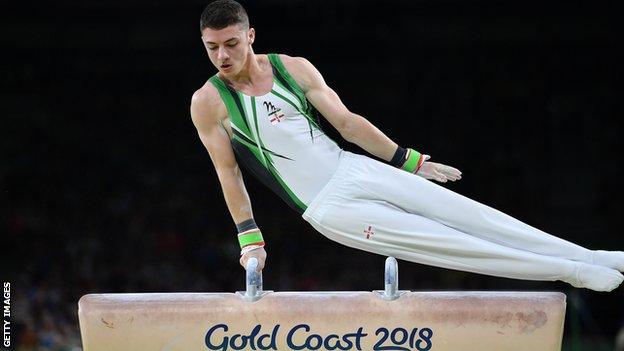Commonwealth Games: 'Huge relief' as NI gymnastics trio's Birmingham ban overturned
- Published

Rhys McClenaghan beat Olympic champion Max Whitlock to win the pommel horse gold for Northern Ireland at the 2018 Commonwealth Games in Australia
Commonwealth Games champion Rhys McClenaghan has said he feels a "huge amount of relief" that he and two fellow Northern Ireland gymnasts will compete at this summer's Games having been granted special dispensation.
McClenaghan, Eamon Montgomery and Ewan McAteer were last month told that they could not compete in Birmingham because they have represented Ireland in international competition.
The International Gymnastics Federation (FIG) has now changed its initial ruling.
Speaking on BBC Radio Ulster's Sportsound Extra Time, McClenaghan said: "It's been a challenging past month or so since we found out we weren't going to the Commonwealth Games.
"It was baffling at the start and it does start to eat away into your psyche a bit, throughout training and after you leave training, but now there's a huge amount of relief."
McClenaghan, who said he found out about the ban being overturned on Twitter, added: "It'll be a huge weight off all of our shoulders. As team-mates we're going to go out there stronger than ever.
'I was in limbo constantly' - McClenaghan
"Outside of the team for these Games, I think of the younger generation who can look at the Commonwealth Games as a target for them to train for as a main goal in their career, which they haven't been able to do over the last month.
"It was a disappointing month but I'm glad it was the right outcome."
Northern Ireland's Sports Minister Deirdre Hargey also welcomed the reversal, saying the decision "rightly recognises the unique position that is conferred upon our citizens under the Good Friday Agreement".
Allow X content?
This article contains content provided by X. We ask for your permission before anything is loaded, as they may be using cookies and other technologies. You may want to read X’s cookie policy, external and privacy policy, external before accepting. To view this content choose ‘accept and continue’.
The move to ban the trio was met with considerable anger from Commonwealth Games NI and a host of athletes and politicians, including Northern Ireland's Secretary of State Brandon Lewis and Tánaiste (Irish deputy PM) Leo Varadkar.
Lewis earlier this month said he was "extremely disappointed by FIG's ongoing refusal" to allow the three gymnasts to compete in Birmingham.
"Their Belfast (Good Friday) Agreement right must be respected and this decision has to change," said the Secretary of State, adding that the trio "have our full support".
Commonwealth Games Northern Ireland had submitted information to the Swiss-based international governing body on the 1998 Good Friday/Belfast Agreement and how it enabled Northern Ireland to consider themselves either British or Irish.
In response to the widespread criticism of its decision, FIG initially suggested that the trio could renounce the Irish nationality on their gymnastics licences to compete in Birmingham.
However, this would have banned the trio from other international competitions for a number of years so was not entertained as a realistic remedy.
Its second suggestion was that the Commonwealth Games Federation (CGF), the event organiser, removed the relevant gymnastics competitions from the FIG's calendar.
However, with the Birmingham event requiring FIG officials to conduct the gymnastics competitions, this again was a non-runner.
Lady Mary Peters joined in the chorus of criticism following the International Gymnastics Federation's surprise move
Subsequently, Northern Ireland's Communities Minister Deirdre Hargey, along with the Commonwealth Games NI, plus officials from both Gymnastics Northern Ireland and Gymnastic Ireland, held what was described as an "open and productive meeting" with FIG on 1 June over the issue.
Following those discussions, Ms Hargey said that everyone around the table "wanted to find a resolution".
McClenaghan, who won a European title for Ireland in 2018 and also represented the island at last year's Olympics, earned Northern Ireland's only gold medal of the 2018 Commonwealth Games, taking the pommel horse title on Australia's Gold Coast.
Many athletes within Northern Ireland's squad for the Games - expected to consist of around 90 competitors - represent Ireland at international level.